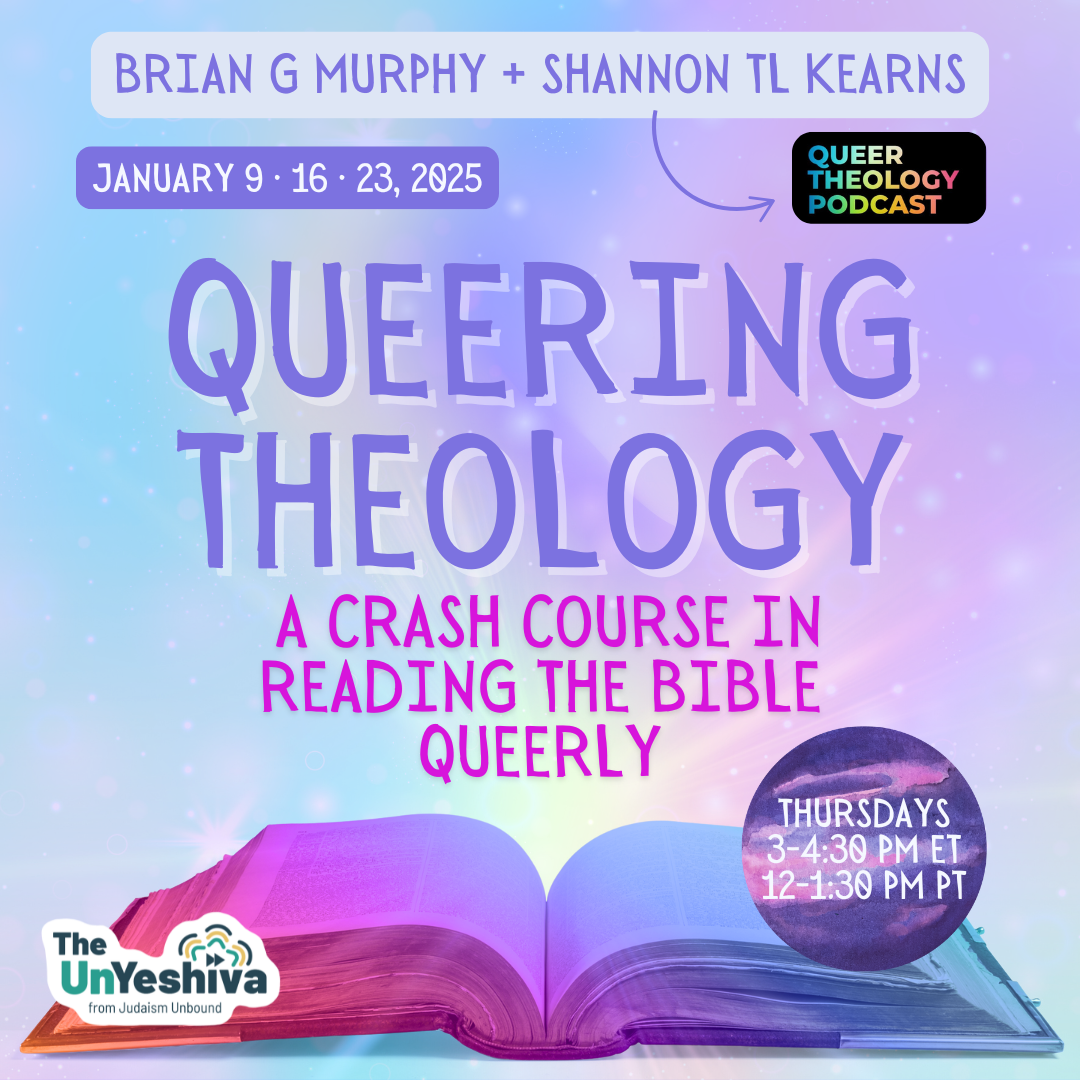Judeo-Futurism
Becca Leviss
3 weeks - January 7 · 14 ·21
Tuesdays - 7-8:30pm ET · 4-5:30pm PT
In this class, we will begin to construct our own framework of Judeo-Futurism, a combination of scholarship, culture, practice, and art through which American Jews can envision and build a generative future. In doing so, we will explore how Judeo-Futurism can link past, present, future, grief, and hope all together in one messy but essential conversation.
Judeo-Futurism differs from other current conversations about Jewish futures, in that it’s not diagnostic or predictive (like a weather forecast). Judeo-Futurism does not present an answer to “what precise events and developments will happen in the future of Judaism,” but instead considers strategies for how to explore the Jewish future — in conversation with the Jewish present and past. With antisemitism and unspeakable violence in Israel-Palestine forcing the American Jewish community to wrestle deeply with questions of identity and solidarity, the need for future-oriented conversations is clear. But how do we do go about having them?
“Let’s face it,” writes Judith Butler, “We’re all undone by each other. And if we’re not, we’re missing something.” Scholars of political philosophy and peacebuilding like Butler and John Paul Lederach, Afrofuturists, and others all give us different tools to help to reimagine what a Jewish future could entail. To define what it means to envision a future “Jewishly,” we will look to other futurist traditions, like Afrofuturism and strategic foresight frameworks. We will examine Jewish thinkers and leaders who have historically done and are doing futurist work right now. And ultimately, we will co-create our own Judeo-Futurist practices to bring into our own lives and channel into the world.
Sliding Scale
This course is available at a sliding scale cost of $126 (the true cost), $99 or $72.
If you can afford the full price, we hope you will choose that option, which allows us to continue to offer lower rates and scholarships to those who otherwise would not be able to access this learning because of financial barriers.
Financial Aid
If you need financial aid beyond the sliding scale, please fill out this simple form, and we will get right back to you.
**Please register each student separately. Your registrations will appear in your shopping cart and you may pay for multiple students together at checkout**
Becca Leviss
3 weeks - January 7 · 14 ·21
Tuesdays - 7-8:30pm ET · 4-5:30pm PT
In this class, we will begin to construct our own framework of Judeo-Futurism, a combination of scholarship, culture, practice, and art through which American Jews can envision and build a generative future. In doing so, we will explore how Judeo-Futurism can link past, present, future, grief, and hope all together in one messy but essential conversation.
Judeo-Futurism differs from other current conversations about Jewish futures, in that it’s not diagnostic or predictive (like a weather forecast). Judeo-Futurism does not present an answer to “what precise events and developments will happen in the future of Judaism,” but instead considers strategies for how to explore the Jewish future — in conversation with the Jewish present and past. With antisemitism and unspeakable violence in Israel-Palestine forcing the American Jewish community to wrestle deeply with questions of identity and solidarity, the need for future-oriented conversations is clear. But how do we do go about having them?
“Let’s face it,” writes Judith Butler, “We’re all undone by each other. And if we’re not, we’re missing something.” Scholars of political philosophy and peacebuilding like Butler and John Paul Lederach, Afrofuturists, and others all give us different tools to help to reimagine what a Jewish future could entail. To define what it means to envision a future “Jewishly,” we will look to other futurist traditions, like Afrofuturism and strategic foresight frameworks. We will examine Jewish thinkers and leaders who have historically done and are doing futurist work right now. And ultimately, we will co-create our own Judeo-Futurist practices to bring into our own lives and channel into the world.
Sliding Scale
This course is available at a sliding scale cost of $126 (the true cost), $99 or $72.
If you can afford the full price, we hope you will choose that option, which allows us to continue to offer lower rates and scholarships to those who otherwise would not be able to access this learning because of financial barriers.
Financial Aid
If you need financial aid beyond the sliding scale, please fill out this simple form, and we will get right back to you.
**Please register each student separately. Your registrations will appear in your shopping cart and you may pay for multiple students together at checkout**
Becca Leviss
3 weeks - January 7 · 14 ·21
Tuesdays - 7-8:30pm ET · 4-5:30pm PT
In this class, we will begin to construct our own framework of Judeo-Futurism, a combination of scholarship, culture, practice, and art through which American Jews can envision and build a generative future. In doing so, we will explore how Judeo-Futurism can link past, present, future, grief, and hope all together in one messy but essential conversation.
Judeo-Futurism differs from other current conversations about Jewish futures, in that it’s not diagnostic or predictive (like a weather forecast). Judeo-Futurism does not present an answer to “what precise events and developments will happen in the future of Judaism,” but instead considers strategies for how to explore the Jewish future — in conversation with the Jewish present and past. With antisemitism and unspeakable violence in Israel-Palestine forcing the American Jewish community to wrestle deeply with questions of identity and solidarity, the need for future-oriented conversations is clear. But how do we do go about having them?
“Let’s face it,” writes Judith Butler, “We’re all undone by each other. And if we’re not, we’re missing something.” Scholars of political philosophy and peacebuilding like Butler and John Paul Lederach, Afrofuturists, and others all give us different tools to help to reimagine what a Jewish future could entail. To define what it means to envision a future “Jewishly,” we will look to other futurist traditions, like Afrofuturism and strategic foresight frameworks. We will examine Jewish thinkers and leaders who have historically done and are doing futurist work right now. And ultimately, we will co-create our own Judeo-Futurist practices to bring into our own lives and channel into the world.
Sliding Scale
This course is available at a sliding scale cost of $126 (the true cost), $99 or $72.
If you can afford the full price, we hope you will choose that option, which allows us to continue to offer lower rates and scholarships to those who otherwise would not be able to access this learning because of financial barriers.
Financial Aid
If you need financial aid beyond the sliding scale, please fill out this simple form, and we will get right back to you.
**Please register each student separately. Your registrations will appear in your shopping cart and you may pay for multiple students together at checkout**
Meet Becca!
Becca Leviss (she/her) is a current candidate for a Masters in Theological Studies at Harvard Divinity School, where she explores the intersection of religion, ethics, and politics, especially in community building and civic engagement work. Her current studies focus on the ongoing relationships between Black and Jewish scholarship and activism, and how those insights can inform critical frameworks for imagining a future for Jewish identity and a pluralistic democracy. She spent her past summer with Mormon Women for Ethical Government (MWEG) investigating how their model of faith-based organizing teaches and encourages civic empowerment and engagement while countering ideological extremism. Prior to her time at Harvard, Rebecca helped build the fundraising team at Protect Democracy––a leading nonprofit in the US democracy movement––where she managed institutional giving and major gifts. Her undergraduate experience in Sociology and Research Analysis at Tufts University included several research projects around philanthropy, religion, youth civic engagement, and racial justice.






